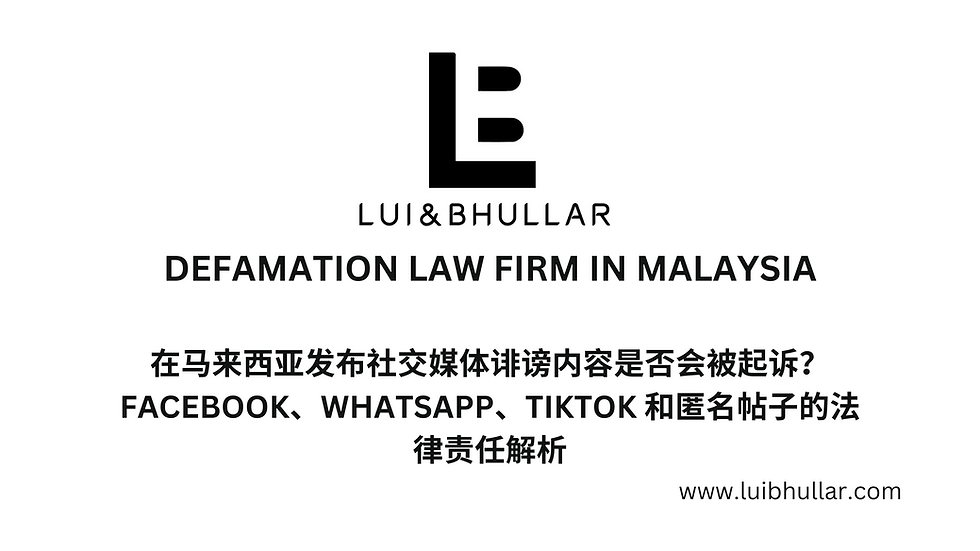Federal Court Clarifies Defamation Law in Malaysia: Half-Truths on WhatsApp Can Harm Reputation
- Messrs Lui & Bhullar
- Jul 16, 2025
- 2 min read
Updated: Oct 15, 2025
BY MESSRS LUI BHULLAR

Federal Court Clarifies Defamation Law in Malaysia: Half-Truths on WhatsApp Can Harm Reputation
In a groundbreaking decision that reshapes the legal contours of online defamation Malaysia, the Federal Court of Malaysia ruled on 5 June 2024 that a statement shared in a WhatsApp group—which omitted key facts and gave a false impression—constituted actionable defamation.
This important decision in Seema Elizabeth Isoy v. Tan Sri David Chiu Tat-Cheong provides authoritative guidance on whether a half-truth statement can trigger liability under defamation law in Malaysia. The ruling is highly relevant for those seeking legal redress for social media defamation, as it further establishes how misleading content in private messaging platforms like WhatsApp can lead to significant reputation damage in Malaysia.
WhatsApp Defamation: What Happened
The appellant, a resident and committee member of a luxury condominium, shared a message in a WhatsApp group suggesting the respondent, a prominent developer, was involved in fraud. Crucially, the message omitted that the respondent had already been acquitted of those charges.
This half-truth statement, although technically not false in isolation, created a false impression that the respondent had been convicted. The Court of Appeal previously found the statement defamatory, citing malice and deliberate non-disclosure. The Federal Court upheld this finding, confirming that deliberate omissions in digital statements can form the basis for a civil defamation case.
Legal Significance and Implications
The Federal Court emphasized that:
A half-truth that causes reputation damage is defamatory.
Malicious omission of truth can nullify defences like qualified privilege and fair comment.
English common law principles apply where Malaysian law is silent (under Section 3(1) of the Civil Law Act 1956).
This ruling reinforces the legal responsibility of individuals on digital platforms and is a stern warning to those engaging in political defamation in Malaysia or spreading unverified claims in online spaces.
Implications for Social Media and Online Defamation Lawyers
The decision highlights that defamation proceedings in Malaysia are no longer confined to traditional media. It also affirms the need for legal advice from an experienced defamation lawyer in KL or a social media defamation lawyer when publishing potentially harmful statements online.
Moreover, the case provides further guidance for:
Libel and slander in Malaysia jurisprudence
Interpreting civil defamation cases on digital platforms
Assessing defamation damages in Malaysia based on context and malice
Addressing complex scenarios in defamation lawsuits Malaysia
Conclusion: The Need for Legal Vigilance
With the proliferation of social media, messaging apps, and digital news platforms, this case underscores the increasing relevance of online defamation lawyer services and the risks of High Court defamation Malaysia actions.
Whether you're a public figure, a businessperson, or an everyday WhatsApp user, exercising caution in sharing statements—especially partial or misleading ones—is now more critical than ever. If you're facing defamation threats or have been wrongfully accused online, it's vital to consult a defamation lawyer or reputation management specialist.
For individuals or entities affected by false or misleading statements, engaging a qualified defamation lawyer in KL or online defamation lawyer is the first step toward defending your rights and reputation. Need Legal Advice on Defamation?
If you're unsure how to sue for defamation in Malaysia or need to identify the person behind defamatory online content, consult our legal team today. At Messrs Lui & Bhullar, we combine strong legal strategy with digital expertise to hold online defamers accountable.
📧 Email: general@luibhullar.com
📞 WhatsApp: +60143000970




Comments